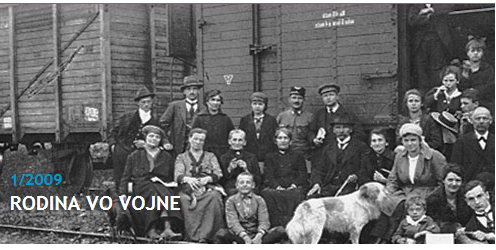Postoje ukrajinského civilného obyvateľstva voči poľskej správe a poľskému vojsku v rokoch 1918 - 1923
The Attitudes of the Civilian Population towards the Polish Administration and the Polish Army in 1918 – 1923
Author(s): Michał KlimeckiSubject(s): Public Administration, Pre-WW I & WW I (1900 -1919), Interwar Period (1920 - 1939), History of Communism, Peace and Conflict Studies
Published by: SAV - Slovenská akadémia vied - Historický ústav SAV
Keywords: World War I; post-war society; Eastern Galicia; Ukrainian population; Polish-Ukrainian war (1918-1920); Polish-Russian war (1920); polish administration; national conflict; communist ideology;
Summary/Abstract: In this text the writer analyses the formation of attitudes of the Ukrainian civilian population settled in the territory of Eastern Galicia towards the representatives of the Polish civilian and military powers in the period of the Polish-Ukrainian (1918-1920) and the Polish-Russian (1920) war conflicts and in the immediately following period when Poland seized power over this territory. He develops the issue against a background formed by a complicated military and political situation in this area (including the consequences of Civil War in Russia which was fought also here). He pays special attention to its impact on everyday life and moods of the Ukrainian civilian population. Among the key factors influencing Ukrainian-Polish relations here was, on the one hand side, a mutual national conflict between the Poles and the Ukrainians over this territory; on the other, there were activities of the Bolsheviks who wanted to extend their power to eastern Galicia too. It ensues from the writer´s analysis that the Ukrainian intelligentsia was ready to cooperate with the Bolsheviks; however, their identification with this ideology remained only at the formal level. The Bolshevik, or Communist ideology and practice based on the negation of private property, which in reality meant an organised confiscation of private or communal property by revolutionary committees established at the same time, was absolutely contradictory to the traditional way of thinking of the Ukrainian peasant. After the defeat of the Bolsheviks in eastern Galicia, the Polish administration and institutes were being introduced into the area. The Ukrainians showed two faces in their attitude to them: the negative one was shaped by the conflict of national ambitions cherished by both sides, whereas the positive owed its appearance to a simple fact: the Polish administration seemed more acceptable than the Bolsheviks. Despite being much criticised by central authorities the process of establishingthe Polish administration at the local level was characterised by abuse of power. Naturally, such a practice was resented by the Ukrainians. Among other factors, reminiscences of these events marking the interwar period contributed to the formation of a negative attitude of the Ukrainians to the Polish state administration and to the Poles as well.
Journal: Forum Historiae. Časopis a portál pre históriu a príbuzné spoločenské vedy
- Issue Year: 3/2009
- Issue No: 1
- Page Range: 0-0
- Page Count: 17
- Language: Slovak

